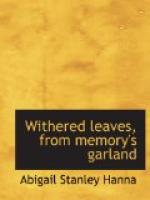She possessed an intuitive knowledge of human nature, which, together with her extreme delicacy, with regard to the feelings of others, formed the keystone which unlocked to her the secret recesses of hearts, which, to a less careless observer, would have been veiled in impenetrable coldness and reserve.
In early life she had given her heart to the Saviour, and had consecrated herself to the service of God; and she sought to follow the example of the meek and lowly Jesus.
The poor, the sick, and the sorrowful, were objects of her peculiar care and attention. Many a poor, crushed and broken-hearted being, borne down by poverty and affliction, was made glad by her sympathy and kindness. She possessed that sweet, graceful way of offering a benefit which rendered a favor from her doubly acceptable. Among the gentlemen of her acquaintance, there were many who, fascinated by the charms both of her mind and person, sought to win her heart, but of all her numerous admirers, there was but one whose affection was reciprocated, and that one was well worthy the love and confidence of such a being as Annie Howard. He possessed those noble qualities of heart and mind which command the admiration of the great and good, and which render man, in the true sense of the term, the noblest work of God. Gifted with strong powers of mind, which had been disciplined by a thorough education, possessing principles of the strictest integrity, and an elegant and prepossessing exterior, he was beloved and esteemed by all who knew him. He was a physician, and had the reputation of being a skilful practitioner. He had resided in the same village with Annie some two or three years, and being of congenial dispositions, and thrown much into each others’ society, a strong attachment had sprung up between them, which was sanctioned by the friends of both parties.
But brilliant intellect, beauty of person, sweetness of disposition, goodness of heart, nor love of friends could save her from death’s relentless dart. In her case, the words of the poet Wordsworth were verrified,
“The
good die first,
And they whose hearts are dry as summer
dust
Burn to the socket.”
Ere nineteen summers had passed over her head, consumption had fastened upon her vitals. At first the symptoms were so slight that her friends felt little alarm, but soon the hollow cough, which sounds so much like a funeral knell, the unnatural brilliancy of the eye, the hectic glow upon the cheek, and the short, labored breathing, told but too plainly that death was not to be cheated of his prey. It has been said that death loves a shining mark, and it is true that he often passes by the loathsome form, shriveled by age, and want, and lingering disease, to feast upon the sparkling eye, the ruby lips, and glowing cheek of youth and beauty.




